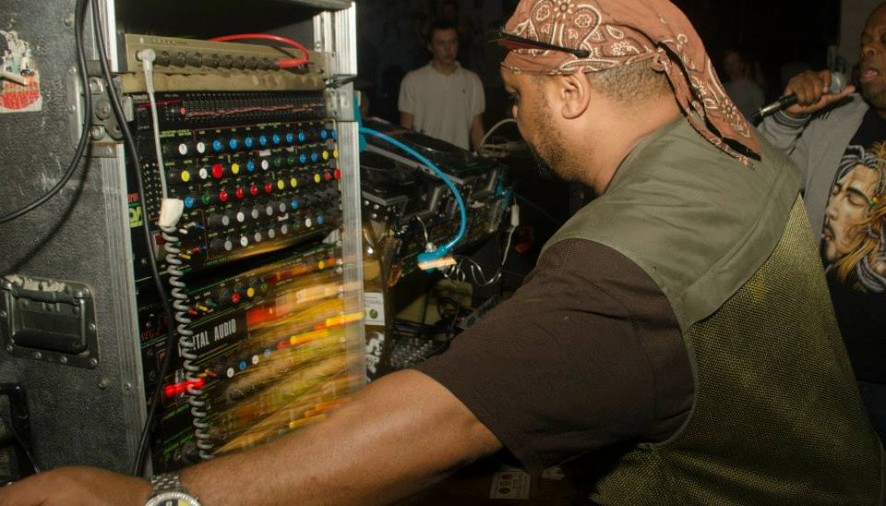You’ve probably heard of dub reggae music, SubDub and Notting Hill Carnival. However sound system culture is something far more than a great night out – it’s a movement and verges on being a musical genre and subculture in itself. InTheMiddle explores sound system culture in Leeds and the UK, its roots and the dub music scene today.
Sound system culture celebrates its diamond jubilee this autumn, with Channel One sound system going on a ‘Sound System 60’ tour around the UK to major cities and student towns to celebrate sixty years of this culture in the UK. Channel One is one of the largest, most well-known sound systems in the world, hailing from east London, their resident home of the Village Underground is host to many dub nights, showcasing what a solid handmade soundsystem is all about. The Channel One brothers, Mikey Dread and Jah T have been playing sound system events since 1979, aiming to unite people using reggae. They have gained their worldwide status from their tours to various countries all over the world and through teaming up with a range of other artists such as Kromestar, The Heatwave and Mala.
Sound system culture started predominantly in the fifties in Jamaica, with the sound system eliminating large live bands. The early sound systems started with a record player, a speaker and an amp. The rhythm and blues sounds from the United States influencing artists at the time were transposed into a Jamaican reggae, ska style through sound systems as well as the bringing in the role of an MC through the introduction of tracks by talking over the song. Sound systems used to be rigged by a generator off the back of trucks and vans to host street parties in Jamaica.
This soon spread to Britain. As sound system culture was, and is, such a crucial part of Jamaican cultural history, it travelled with the influx of Caribbean migrants to the UK, continuing to bring people together and diffuse the roots reggae sound. Music being the powerful medium that it is, sound systems were influenced by the social and political changes Jamaica under went in the mid-twentieth century, including Jamaica gaining its independence from Britain in 1962. Since then sound systems have been linked to liberal and political ideas, due to their emergence around this poignant time for Jamaica.
Leeds has so much to offer in terms of sound system culture as there are several home grown Leeds sound systems, the most well-known and original being The Iration Steppas, led by sound system expert, Mark Iration. The Iration Steppas sound system is often used for the regular dub reggae night, Subdub, and is hand built to perfection. Mark Iration lives and breathes his passion for sound system production and sound, which is reflected in the consistency of his performances at dances like Subdub. The Iration Steppas call themselves ‘The Vanguard Of Dub, Playin Dubz Inna Year 3000 Style.’ This epitomises their style and use of dub music to take music in a new direction, bringing something new to the dub plate and always keeping it original. In a previous interview Mark Iration explains ‘‘you want to hear the freshest sounds you got to get out there, down the dance to hear them sounds.’’ For sound system culture this remains the same today in some respects, as to get real feel for the culture, you have to go to a sound system night, to hear and feel the bass shaking the floor and through your whole body – the best experience of dub reggae music.
The dub roots reggae sound is so specific; it encompasses heavyweight bass, a reggae rhythm and beat, siren noises, horn blares, alongside varying echoed and distorted sounds, creating its signature sound. The dub plates, sound systems and MCs vary artist to artist, and being handmade makes them one of a kind, giving sound system culture its uniqueness and intricate variety. In the early days of sound systems in seventies Britain, the scene consisted of blues parties in the street where people in areas like Notting Hill in London would set up a sound system on the corner of the street. It was free for anyone to come and dance, and you would find out about them either through word of mouth or flyers advertising the night that would be passed around to invite people to come down. In contrast, dub reggae nights today very much have an online presence and popularity and are on a much larger scale; for example in Leeds with over a thousand people attending a single Subdub event on Facebook. However, there are still flyers and posters to advertise the night, but tickets need to be bought well in advance of the night as online or paper tickets – this itself highlights the corporate influence upon sound system culture and the lack of freedom to simply set up a sound system in the street as done so in the past; the focus shifting to profitability with people paying up to £15 or more for a ticket.
In light of this, as was the aim with reggae music, sound system culture is a ‘culture’ as it aims to unite people through a sound that can appeal to anyone, and that anyone can dance to. Its historical associations with liberal political ideas and unity between people of different backgrounds also relates it to messages concerning peace, love, human rights and health. Despite being more commercialised, these ideas remain relevant and necessary to be heard in today’s society, perhaps more than ever.
Subdub presents Sound System 60 Tour takes place on 31st October at Leeds West Indian Centre. See Facebook event for tickets.
Stephanie Uwalaka

